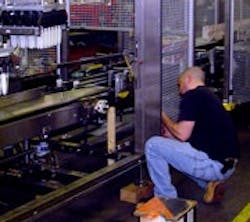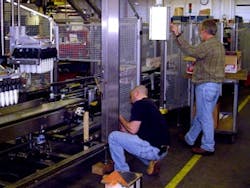Case-and-Tray-Packer Builder Meets the Needs of Varied Industries
Case and tray packers for the food, beverage, chemical and personal-care industries are the primary machines designed and built by Standard-Knapp (www.standard-knapp.com), an employee-owned company located in Portland, Conn. However, its product line also includes an uncaser, multi-packer or bundler, slitter/sealer and product laner.
"There are many unique differences in each of the industries we serve," says Mario Mazzotta, customer relations and marketing manager. "The food and beverage industries are constantly increasing their demand for faster equipment, gentle product handling and high efficiencies. The chemical and personal care industries are developing many new bottle designs that are very attractive but difficult to handle in a standard case packer."
The 125-year-old company employs around 60 people, and its machines are sold primarily in North America, Central America and Asia. Machines also are supported by manufacturing licenses in Europe and Japan.
Thirteen engineers—10 mechanical and three electrical—comprise Standard-Knapp's technical staff.
Networking on its machines is both hardwired and digital, says Reilly. "We're not currently using wireless networking, due to the cost and noise issues associated with wireless."
All of Standard-Knapp's machines include safety relays. "We use safety relays to comply with NFPA requirements," explains Reilly. "New safe off features in AB drives and servos allow Category 3 safety rating without the wiring, external contactors and panel space."
Standard-Knapp employs highly trained field service engineers (FSEs) throughout the U.S. "These FSEs also perform all of our machine training at the customer's facility," says Mazzotta. "The training is divided between classroom and hands-on sessions. We stock a large inventory of parts and typically ship part orders the same day that they are ordered."
Technology also helps with after-sales support on issues such as troubleshooting and diagnostics. "Our new graphically driven operator interface system now has a very detailed preventive maintenance schedule that visually alerts maintenance personnel of upcoming servicing," explains Mazzotta. "Maintenance can now simply navigate to the correct screen on the HMI and plan for upcoming service without stopping the machine or waiting for component failure."
At Standard-Knapp, innovation is driven by customer demand and cost, explains Reilly. "We believe advances in networking will have the greatest impact on our machine design," he says. "With advances in networking, the main difference or benefit will be the use of less wiring for controls and communications."



